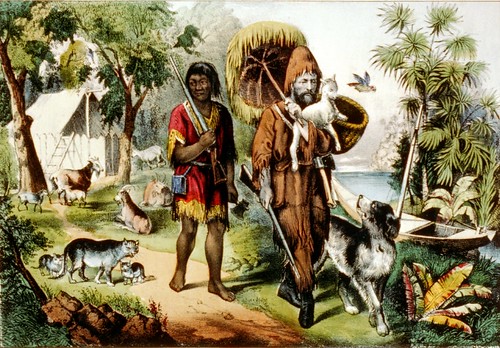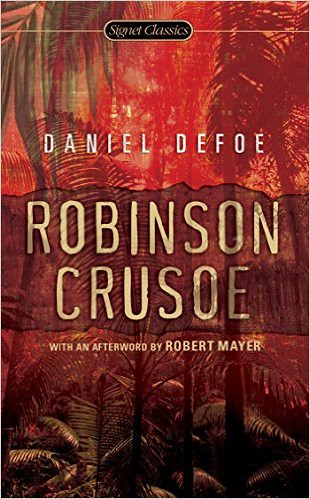“Thus fear of danger is ten thousand times more terrifying than danger itself.”
―Daniel Defoe, Robinson Crusoe
During this past two weeks, amidst the daily routine of teaching, I read a story of a man marooned on an uninhabited island. This story is probably the world’s most famous tale about living in isolation on a desolate island, in which the main character may be associated with the very personification of the word ‘survival’. It is the story of Robinson Crusoe, a good read with engaging moments here and there, but its level of enjoyment and readability heavily relies upon the readers’ perception and sense of empathy (I somehow enjoyed it! :P).
“Robinson Crusoe” is a fictional autobiography of Robinson Kreutznaer, eventually becoming Robinson Crusoe due to the constant morphing of the English language, and his series of unfortunate voyages as well as several overly nice blessings for the poor soul. One day, Robinson Crusoe says that he wants to venture out to the sea, an idea that his parents greatly expostulate against (I am proud of learning this word due to the constant usage of the word in the book XD ). Ignoring his parents’ pleas to stay at home, Robinson decides to go out to the sea by riding in one ship owned by his friends’ father to London; a journey that marks the start of his being enslaved, owning slaves, and eventually his self-proclaimed ‘punishment for the general course of his wicked life’ of being stranded on an island for over twenty years.
As one of the earliest English novels, even the first one, “Robinson Crusoe” is able to impressively capture the depressing feelings of isolation and helplessness, with us reading the lonely passages coming from Robinson, we can picture the situation of having no one to talk to while having to fulfill daily necessities such as food and shelter. Speaking of fulfilling needs, Robinson is the ultimate survivor; we will read about his endeavors in mastering craftsmanship of making pots, baskets, and fences for the fortification of his castle (he really calls his place a castle), as well as his displaying of the superb navigational capabilities in recognizing the sea currents, wind, and the measurement of the nautical leagues. Not only that, we are also explained his efforts in animal husbandry. In short, every crook and cranny about Robinson Crusoe’s attempt in nourishing himself and make his life on the island safe. Now, this is probably a good thing; detailed explanations are often welcomed by the readers, but when things start to get too technical, I just cannot enjoy reading the large blocks of text; several paragraphs explaining his attempt to build a fence are just too much for me. Though, I can understand why some people might like it :).

The story of Robinson Crusoe and his trusty servant Friday created the genre “Robinsonade”, or the genre involving the characters deserted on an island. Source: https://upload.wikimedia.org/wikipedia/commons/d/dc/Robinson_Crusoe_and_his_man_Friday_-_Currier_%26_Ives_c.1874.jpg
Perhaps you have realized this by now, but being published in 1719, the book contains more than a few of archaic spellings and sentence structures that are very rarely used today. Combined with the large chunk of detailed texts (there are even several single-paragraphs that fill the entire page), it can be a daunting task to finish the book, resulting in some readers perhaps might skim through the highly technical passages to get into the plot advancement.
Now, let’s talk about empathy. Robinson Crusoe lives during the time when religion and slavery are the focus of the society; so things like conversion to Christianity as well as Biblical reflections and the practice of slave-trades are plentiful; expect Robinson degrading the native tribes, or what he calls as ‘wretches and savages’, along with his upholding his superiority and the European powers while treating women as ‘lesser beings’ at times (though the involvement of women are scarce in the book). Do remember, too, that our main character is a person filled with wanderlust who abandons his nice parents who have lost two of their sons in search of his dream fulfillment to go to the sea 😦 ; this can make readers difficult to adjust with the historical context and feel what Robinson feels in the book.
I’m not saying the book is not appealing since there are quite a number of very interesting moments (Friday! Oh, and the showdown against the cannibals, yes, THOSE cannibals), but rather than the primary focus, the book decides to emphasize deeper elements in its narrative, putting the spotlight on Robinson’s thoughts and faith; the actions merely serve as the reasons for him to shape and reveal those two aspects. Thus, for me, the book is certainly enjoyable from time to time, but it can be quite a chore as well.
In spite of the book’s highly influential prestige and importance in literature as well as inventing the genre of island-survival, “Robinson Crusoe” is a book that is, to me, meant to be read academically rather than pure-entertainment. You either like it, hate it, or impassive towards it, but it is undeniable that it is one of the most popular and important piece of literature in history 🙂 .
Rating from me: 3/5
Have you visited Crusoe’s Island in the pages? Tell us your thoughts 🙂
